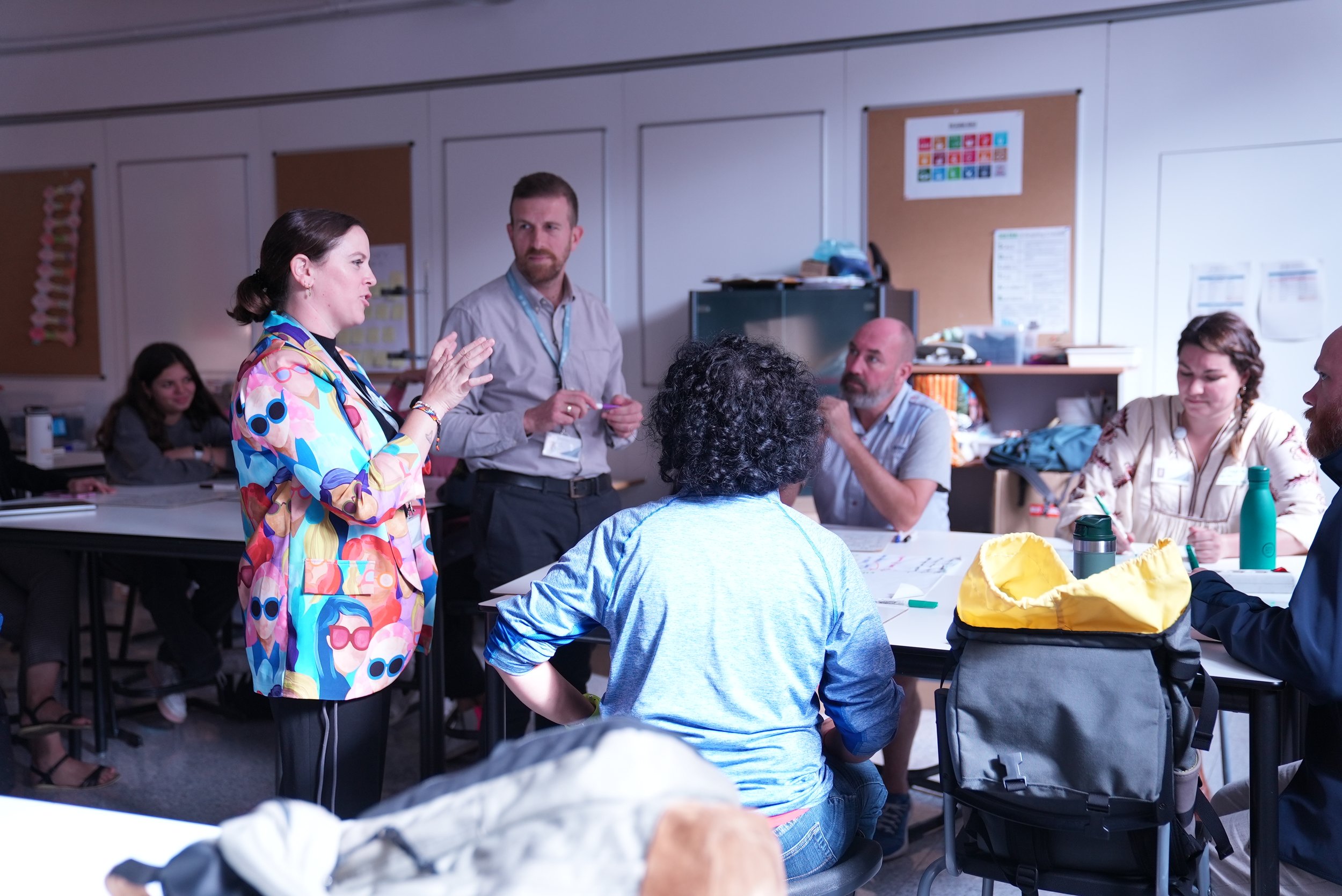Uniting the School Community around a Sustainability Mission
The Benjamin Franklin International School (BFIS) has reached major sustainability milestones through its Eco-Committee and high school sustainability club (the Going Green Club). Notable achievements include earning the Green Flag award for sustainable education, cutting paper use by 50%, eliminating single-use plastics in the cafeteria, and implementing Meatless Wednesdays. Additionally, the school has installed solar panels, recycling bins, and a rooftop garden while reducing electricity consumption by 14%. BFIS actively engages students, staff, and families in eco-friendly initiatives, fostering a culture of sustainability throughout the campus and curriculum.
When Rose joined the Benjamin Franklin International School (BFIS) in Barcelona, Spain, two years ago, she was given the dual role of Going Green Club Advisor and EcoSchools Coordinator. Since then, she has been a pivotal force in spearheading sustainability initiatives at BFIS, drawing on her previous experiences to guide her efforts. Here, she shares some of their winning strategies for driving sustainability at BFIS.
> Empower Sustainability Coordinators
BFIS has recognized the importance of school sustainability and has provided support to Rose's role in leading their efforts, including reducing her teaching load to provide for increased planning and preparation time. This has allowed the sustainability program to grow in momentum and depth. "The leadership team has been incredibly supportive," Rose explains. "They gave me the time and the resources I needed to focus on sustainability initiatives." This support allows her to dedicate time to the program, which is critical in developing and maintaining momentum.
> Engage Allies and the Community
Parents can be a helpful resource and ally for school sustainability efforts. For example, Rose recalls how a parent-organized gala raised money specifically for sustainability initiatives, which helped fund the creation of a rooftop garden at the school. Parents have also become more engaged in making school events, such as the International Food Fair, more sustainable. "Having the resources to purchase materials and fund projects has been huge," she notes.
Young students at BFIS experience hands-on learning about composting on their school’s rooftop garden.
> Empower Students
Empowering student leadership in sustainability has contributed to student passion and action. The Going Green Club at BFIS was originally run by passionate 10th graders, especially during COVID-19 when parents weren't allowed on campus. The students took charge of sustainability initiatives and kept the club running even without adult oversight. The club has continued to thrive under Rose’s leadership where students actively participate in various projects, such as educating younger students about sustainability, volunteering in the rooftop garden, working on composting initiatives, and being active participants and leaders in the whole-school Eco-Committee.
> Incentives Work: Snacks for Sustainability!
One of the effective strategies Rose has employed to engage the school community in sustainability has been what she humorously refers to as "bribery." She explains what another teacher advised her to do to provide incentives to participate: "Sometimes you need to offer something to get people in the door. I started buying sandwiches and cookies for meetings, and it worked. People showed up, got to eat delicious food, and then we got to have those important conversations about sustainability at the same time."
> Build a Diverse Sustainability Committee
Rose helped to establish the school’s Eco-Committee, a group that includes members from various segments of the school community—students, teachers, and leadership. The committee meets regularly to discuss and plan sustainability initiatives, ensuring broad representation and buy-in. Rose emphasizes the importance of creating a welcoming environment where everyone feels they can contribute, even if it’s just during their lunch break.
Having a diverse coalition of stakeholders is one of the best ways to build resilience and momentum for your school’s sustainability program!
> Define a Sustainability Mission and Review it Annually
As part of its participation in the EcoSchools program, BFIS has developed an ‘Eco Code’ - a mission statement for its Committee. They review and update this mission annually, aligning it with the school’s sustainability goals and the chosen EcoSchools theme for the year. Last year, the focus was on biodiversity, and the committee worked collaboratively to draft an updated version of the code that reflected their goals and values. This year, the BFIS community voted to focus on the change they wanted to make this year and chose SDG 14: Life Below Water. The Eco-Committee and Going Green Club will focus on the theme (Protecting and conserving water-based ecosystems) to align with SDG 14 and will update their Eco-Code accordingly.
BFIS students play an active role in determining their school’s sustainability mission for the year.
> Make your Mission Statement Understandable for Everyone
"We wanted to make the [Eco Code] document accessible to everyone, especially the younger students," Rose explains. "So, we simplified the language and included examples that kids could easily understand." The process involved several meetings where the Eco-Committee reviewed the school’s previous sustainability mission statement, discussed necessary changes, and grouped ideas into categories that aligned with the school's mission statement and future goals.
BFIS ensures the language in its EcoCode is understandable for everyone, including younger students.
> Communicating your Sustainability Mission (e.g. on your school website) can bring in more allies and support
The new mission statement has had a noticeable impact on the school community. "We’ve seen parents become more involved, asking how they can make events like the International Food Fair more sustainable," Rose shares. The fair now uses compostable plates and partners with a local soda company that provides beverages in recyclable glass bottles. These small changes have started to shift the culture at BFIS, with more people thinking about sustainability in their daily lives. See how BFIS celebrates their sustainability achievements on their website here.
> Be patient and persistent
Rose emphasizes the importance of being patient and persistent. "Change doesn’t happen overnight. It’s about taking small steps and celebrating the successes along the way." By focusing on creating a culture of sustainability, rather than just implementing isolated projects, schools can make lasting and meaningful progress.
Looking Ahead: Expanding Sustainability Initiatives at BFIS
Rose has big plans for the future of sustainability at BFIS. One of her primary goals is to expand the composting program, which began last year with the creation of a rooftop garden. The garden, maintained by students during their elective gardening flex period, has become a focal point for sustainability education at the school. Rose hopes to involve more parents as volunteers and eventually integrate cooking lessons into the program, teaching students about different cultures through food.
She is also advocating for sustainability to be a central consideration in the school's upcoming construction projects. "We’re hoping to include a rooftop garden in the new Center for Innovation and Creativity," Rose says. Additionally, she’s exploring the possibility of implementing rainwater collection systems and using gray water for landscaping, especially in light of the ongoing drought in Catalonia.
By working collaboratively, patiently, and intentionally, small incremental changes can lead to systemic change with a positive impact on both the school and the local community. As Dr. Jane Goodall says, “What you do makes a difference, and you have to decide what kind of difference you want to make.” Rose loves this quote and uses it to guide her sustainability work at BFIS by creating global changemakers with a passion for bettering the world.
“What you do makes a difference, and you have to decide what kind of difference you want to make.” - Jane Goodall
Rose Scovatto, Science Learning Leader, MYP/ DP Bio & ESS Teacher, Going Green Club Advisor & EcoSchools Coordinator at BFIS.







